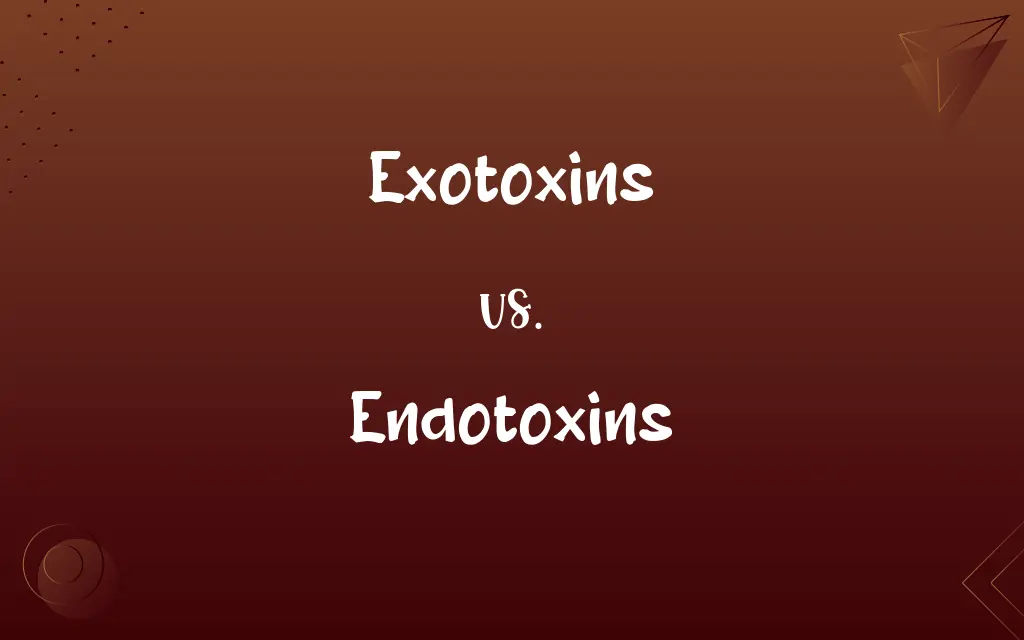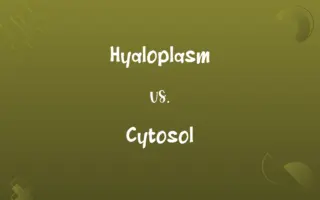Exotoxins vs. Endotoxins: Know the Difference

By Shumaila Saeed || Published on December 26, 2023
Exotoxins are potent, protein-based toxins secreted by bacteria, whereas endotoxins are less toxic, lipid-based components of the outer membrane of Gram-negative bacteria.

Key Differences
Exotoxins are complex proteins produced and secreted by certain bacteria, including both Gram-positive and Gram-negative types. They are typically released during bacterial growth. Endotoxins, in contrast, are lipopolysaccharides found in the outer membrane of Gram-negative bacteria, released primarily when the bacteria die and the cell wall breaks apart.
Shumaila Saeed
Dec 26, 2023
Exotoxins are highly toxic and can cause severe damage to the host, often through specific action on host cells, like disrupting protein synthesis. Endotoxins are less potent but can trigger significant immune responses, particularly causing fever and inflammation.
Shumaila Saeed
Dec 26, 2023
Exotoxins are generally heat-labile, meaning they lose their toxicity when heated, which is why boiling food
Shumaila Saeed
Dec 26, 2023
Exotoxins can elicit strong antibody responses, known as antitoxins, in the host body. This response can be harnessed to create vaccines. Endotoxins, on the other hand, often trigger a non-specific immune response, which can be harmful, leading to conditions like septic shock.
Shumaila Saeed
Dec 26, 2023
Examples of diseases caused by exotoxins include tetanus, diphtheria, and botulism, each caused by a specific exotoxin-producing bacterium. Endotoxins are associated with systemic responses like sepsis, commonly seen in infections with Gram-negative bacteria like E. coli or Salmonella.
Shumaila Saeed
Dec 26, 2023
ADVERTISEMENT
Comparison Chart
Source
Secreted by bacteria (Gram-positive and negative)
Part of Gram-negative bacteria's outer membrane
Shumaila Saeed
Dec 26, 2023
Heat Stability
Generally unstable (denatured by heat)
Stable (resistant to heat)
Shumaila Saeed
Dec 26, 2023
Immune Response
Elicit strong, specific antibody response
Trigger general immune response
Shumaila Saeed
Dec 26, 2023
Examples of Related Diseases
Tetanus, Diphtheria, Botulism
Sepsis, Infections by E. coli, Salmonella
Shumaila Saeed
Dec 26, 2023
ADVERTISEMENT
Exotoxins and Endotoxins Definitions
Exotoxins
Exotoxins are bacterial byproducts that target specific cell functions or structures.
Diphtheria's severity is due to an exotoxin disrupting protein synthesis in cells.
Shumaila Saeed
Dec 13, 2023
Endotoxins
Endotoxins are structural components of Gram-negative bacteria that cause inflammation.
The presence of endotoxins in the bloodstream can trigger a dangerous, systemic inflammatory response.
Shumaila Saeed
Dec 13, 2023
Exotoxins
Exotoxins often act as neurotoxins, enterotoxins, or cytotoxins, affecting different body systems.
The exotoxin in cholera prompts severe diarrheal illness by targeting intestinal cells.
Shumaila Saeed
Dec 13, 2023
Endotoxins
Endotoxins activate the host's immune system non-specifically, often causing collateral damage.
The indiscriminate immune response to endotoxins can sometimes lead to organ failure.
Shumaila Saeed
Dec 13, 2023
Exotoxins
Exotoxins are potent, secreted proteins from bacteria that cause specific harmful effects.
The exotoxin produced by Clostridium tetani causes the severe muscle spasms seen in tetanus.
Shumaila Saeed
Dec 13, 2023
ADVERTISEMENT
Endotoxins
Endotoxins are less potent than exotoxins but dangerous in high concentrations.
In industrial settings, workers exposed to high levels of endotoxins may develop chronic respiratory issues.
Shumaila Saeed
Dec 13, 2023
Exotoxins
Exotoxins, as antigenic substances, can stimulate a strong immune response.
The exotoxin of Staphylococcus aureus can cause toxic shock syndrome.
Shumaila Saeed
Dec 13, 2023
Endotoxins
Endotoxins are heat-stable lipopolysaccharides integral to certain bacterial cell walls.
Endotoxins released during bacterial lysis in the gut can lead to gastrointestinal symptoms.
Shumaila Saeed
Dec 13, 2023
Exotoxins
Exotoxins are enzymatic proteins that can destroy host tissues and cause disease.
Botulinum exotoxin causes paralysis by inhibiting neurotransmitter release.
Shumaila Saeed
Dec 13, 2023
Endotoxins
Endotoxins can provoke fever and shock, particularly in severe bacterial infections.
Septic shock in patients is often attributed to the systemic effects of endotoxins.
Shumaila Saeed
Dec 13, 2023
Exotoxins
A poisonous substance secreted by a microorganism and released into the medium in which it grows.
Shumaila Saeed
Dec 08, 2023
Endotoxins
A toxin produced by certain bacteria and released upon destruction of the bacterial cell.
Shumaila Saeed
Dec 08, 2023
Repeatedly Asked Queries
Can exotoxins be used to create vaccines?
Yes, their specific action allows for the development of antitoxin vaccines.
Shumaila Saeed
Dec 26, 2023
What are exotoxins?
Proteins secreted by bacteria that cause specific harmful effects.
Shumaila Saeed
Dec 26, 2023
What is the mode of action of exotoxins?
Exotoxins can act by damaging host cells, interfering with cell signaling, or inhibiting protein synthesis.
Shumaila Saeed
Dec 26, 2023
What are the symptoms of exotoxin-related infections?
Symptoms vary depending on the specific exotoxin and bacteria involved but may include fever, diarrhea, and paralysis, among others.
Shumaila Saeed
Dec 26, 2023
How do exotoxins work?
They target specific cell functions or structures, disrupting normal activity.
Shumaila Saeed
Dec 26, 2023
Are exotoxins produced by both Gram-positive and Gram-negative bacteria?
Exotoxins are mainly produced by Gram-positive bacteria, but some Gram-negatives also produce them.
Shumaila Saeed
Dec 26, 2023
What is the mode of action of endotoxins?
Endotoxins primarily activate the host's immune response, leading to inflammation and potential tissue damage.
Shumaila Saeed
Dec 26, 2023
Can endotoxins be used in vaccines?
Endotoxins are not typically used in vaccines because of their strong potential to cause adverse reactions.
Shumaila Saeed
Dec 26, 2023
Are endotoxins produced by Gram-positive bacteria?
No, endotoxins are specific to the cell walls of Gram-negative bacteria.
Shumaila Saeed
Dec 26, 2023
What are the symptoms of endotoxin-related illnesses?
Symptoms can include fever, chills, low blood pressure, and shock, depending on the severity of the infection.
Shumaila Saeed
Dec 26, 2023
Can exotoxins be used in vaccines?
Some exotoxins, when inactivated, can be used in vaccines to induce immunity.
Shumaila Saeed
Dec 26, 2023
Can exotoxins be targeted by antibiotics?
Some antibiotics can target the bacteria producing exotoxins and thereby reduce their effects.
Shumaila Saeed
Dec 26, 2023
Can antibiotics directly target endotoxins?
Antibiotics are generally ineffective against endotoxins themselves but can target the bacteria producing them.
Shumaila Saeed
Dec 26, 2023
Share this page
Link for your blog / website
HTML
Link to share via messenger
About Author
Written by
Shumaila SaeedShumaila Saeed, an expert content creator with 6 years of experience, specializes in distilling complex topics into easily digestible comparisons, shining a light on the nuances that both inform and educate readers with clarity and accuracy.








































































